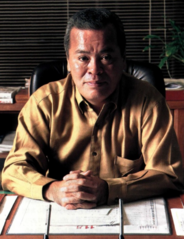Akira Nagai
From Sega Retro

|
| Akira Nagai |
|---|
| Place of birth: Japan |
| Date of birth: 1943-08[1] |
| Date of death: 2022-11-15[2] (age 79) |
| Employment history: Nihon Goraku Bussan (1963[3] – )
Divisions:
|
| Role(s): General Manager, Executive |
Akira Nagai (永井 明) was a Japanese businessman. Between 1965 and 2004, he was one of Sega's longest standing managing directors and representatives, initially involved in jukebox distribution at Nihon Goraku Bussan since 1963 and continuing in amusement machine sales into the 1980s.
Nagai was most associated with Sega's amusement facility business during the 1990s, where he managed the Amusement Theme Park concept. He was also known for his cameo as a yakuza boss in Shenmue. He retired from Sega in 2004, and passed away at 79 in November 2022.
Career
Akira Nagai joined Nihon Goraku Bussan in 1963, twenty years on from his birth in August 1943.[1] Marking the start of a 40 year career with what would subsequently become Sega, Nagai began work in Goraku Bussan's sole original purposes, machine sales and distribution.[5] He remained in this area as the company merged, grew, and evolved, from selling jukeboxes to imported amusement machines and eventually its own in-house works, as well as its efforts in planning and operation of directly-managed amusement facilities.[5] Nagai worked as a representative during the 1970s,[6] and with the completion of CSK's purchase of Sega from Gulf+Western in July 1984, he was promoted to be general manager of the sales and marketing divisions.[7]
In a May 1989 reorganisation, Nagai moved to be director of the newly-formed leisure development division, in charge of property development and design of amusement facilities.[8] Prior to this, Sega had already made steps towards broadening the company's consumer base through its urban Hi-Tech Land Sega chain, implementation of brighter décor and lighting under the industry's "3K Cleanup Campaign" and its reliance on their own successful produce; however, the bubble economy had seen urban land costs rising. Off the back of recent success in Joy Square in Hamamatsu and the first Sega World openings in cheaper suburban Ito-Yokado department stores, Nagai worked alongside six division chiefs, bringing further improvements such as gendered bathrooms in all locations.[5]
Exceeding forecasted profit margins, the locations that opened under him during the late 1980s and early 1990s were highly successful among families and young people. Such was the success of one facility in particular with these groups, it is said to have been unprecedented even by Nagai himself; he was subsequently reprimanded by Hayao Nakayama for failing to predict its potential appeal.[9] Hisashi Suzuki also reportedly did not approve of the tendency to acquire centerpiece equipment from other manufacturers for the locations; investment was duly made in attraction-focused team Sega AM5, their elaborate works soon necessitating even bigger venues.[9] With this, the bubble economy bursting, and keen interest in similar ideals by industry rivals such as Namco, Nagai led a move back into urban facilities such as Roppongi GiGO, as well as indoor theme park entertainment through the Amusement Theme Park concept.[10]
Whilst retaining control of the amusement center operations division,[11] Nagai became heavily involved in the dedicated ATP Division, staff training, and strategy for Joypolis branches.[12] His high-profile at Sega during this period also led to interviews in Kasou Genjitsu Yuugi Taizen and Sogo Amusement Kigyo Sega,[13] alongside other influential figures including Hideki Sato, Takenori Ogata, and Yu Suzuki.[14] He remained in the company throughout financial turmoil in the late 1990s; though the amusement facility business was hit, with its number of locations more than halving from a 1,000-strong count and the failed Entertainment STAGE net@ initiative,[15] its development continued to innovate with successful new chain concepts Sega Arena and Club Sega.[16]
Nagai's most senior role at Sega came in 2001, when he moved to be representative director of the restructured amusement operations and sales divisions.[5] Three years later, he retired in the wake of the completion of its merger with Sammy, many of his former colleagues having already left.[17]
At the age of 79, Nagai passed away on November 15, 2022; Yuji Naka publicly broke the news of his passing on Twitter.[18]
Photographs
- Main article: Photos of Akira Nagai
Magazine articles
- Main article: Akira Nagai/Magazine articles.
External links
- Sega Arcade History: The Formative Years - translation of Japanese interview originally found in Sega Arcade History
References
- ↑ 1.0 1.1 http://www.checkcompany.co.uk/director/4790244/AKIRA-NAGAI (Wayback Machine: 2022-05-05 18:46)
- ↑ @nakayuji on Twitter (archive.today)
- ↑ Sega Arcade History, Enterbrain, page 24
- ↑ Sega Magazine, "1997-02 (1997-02)" (JP; 1997-01-13), page 14
- ↑ 5.0 5.1 5.2 5.3 File:Sega_Arcade_History_JP_EnterBrain_Book-1.pdf, page 24
- ↑ Game Machine, "1978-11-01" (JP; 1978-11-01), page 8
- ↑ Game Machine, "1984-07-01" (JP; 1984-07-01), page 5
- ↑ Game Machine, "1989-05-15" (JP; 1989-05-15), page 2
- ↑ 9.0 9.1 https://blog.goo.ne.jp/lemon6868/e/c05a21f4c655a617cf9ce433e0651744 (Wayback Machine: 2022-11-03 02:49)
- ↑ https://blog.goo.ne.jp/lemon6868/e/e813708f83b15c080885839bed6a7ad0 (Wayback Machine: 2022-11-20 01:44)
- ↑ File:AnnualReport1995 English.pdf, page 23
- ↑ Harmony, "1994 7" (JP; 1994-07-01), page 14
- ↑ http://www.web-japan.to/book/review_sega.htm (Wayback Machine: 2001-12-26 05:59)
- ↑ File:Virtual Reality JP 1x03.mp4
- ↑ Famitsu, "2000-10-20 extra" (JP; 2000-10-06), page 10
- ↑ File:AnnualReport1999_English.pdf, page 14
- ↑ https://www.ampress.co.jp/backnumber/bn2004.06.01.htm (Wayback Machine: 2004-09-07 03:51)
- ↑ @nakayuji on Twitter (archive.today)